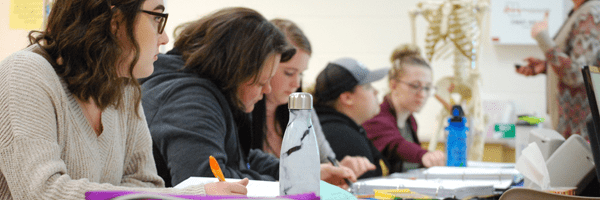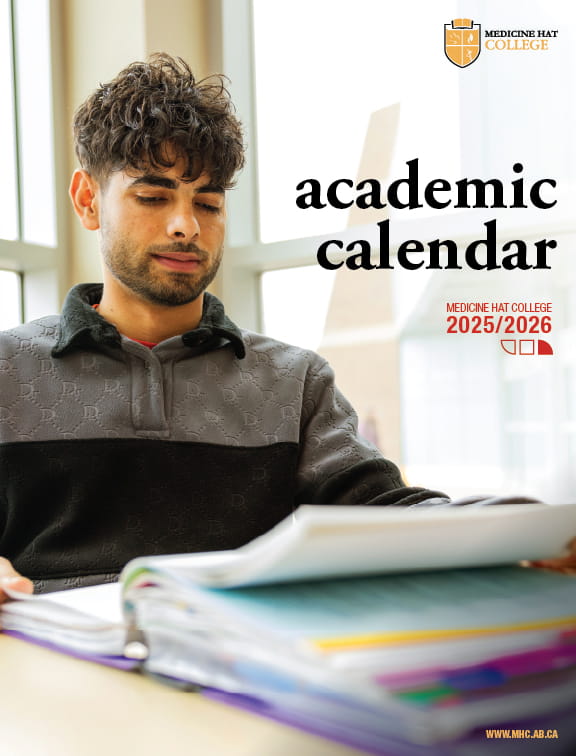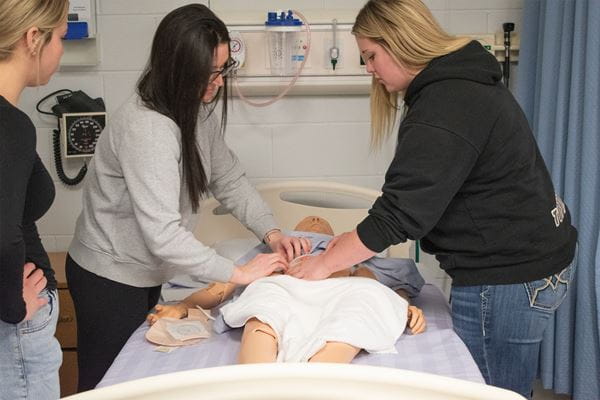Earn your Pharmacy Technician diploma at Medicine Hat College
Pharmacy Technicians (RPhT) play a key role in providing patients with quality health care services and are in high demand for their expertise, knowledge and skills.
Regulated pharmacy technicians are involved with dispensing prescriptions, preparing compounded medications and sterile products, repackaging pharmaceuticals, managing inventory, teaching patients to use medical devices, and providing patient care.
Pharmacy technicians are regulated healthcare professionals who most commonly work in community and hospital pharmacies, but they may also work in clinics, long-term care and distribution facilities or hold educator, management, and many other specialty positions. Pharmacy technicians also work closely with pharmacy assistants, to ensure they have the proper training and provide them with supervision to work safely.
Program Learning and Delivery
The Pharmacy Technician program is a two-year (five-semester) diploma offered at the Medicine Hat campus, with intake beginning each Fall. The program is designed to prepare diverse learners to reach their full potential as registered pharmacy technicians by providing innovative, learner-centered education that is both competency- and skills-based, all within an inclusive learning environment, as well as preceptor supervised clinical experiences. In the lab, students have the opportunity to use technologies currently employed by those working in the profession, including laminar airflow hoods and Kroll® computer software.
- Clinical experiences may require travel to other parts of the region
- Please note that some Pharmacy Technician lab courses are located off-site within a five-minute drive of the Medicine Hat campus.
The study of Pharmacy Technician practice places students in a position of special trust with registered Pharmacy Technicians, Pharmacists, other health-care professionals, and their patients or clients. The faculty of the program recognize that the education occurs both inside and outside the classroom and has the responsibility to ensure that its graduates are competent and ethical.
At the conclusion of MHC’s Pharmacy Technician Program, students will be able to:
- Model a thorough understanding of the knowledge required of a pharmacy technician.
- Apply knowledge of pharmaceutical science, pharmacy practice, and biological sciences to recognize when to consult.
- Communicate effectively in written and spoken forms in the role of a pharmacy technician to establish caring relationships with patients and maintain collaborative professional relationships.
- Accurately apply and execute mathematical operations, especially in the realm of pharmaceutical calculations.
- Demonstrate critical thinking and problem-solving skills within the context of operational pharmacies.
- Use appropriate pharmacy management software to locate, select, and document appropriate information.
- Display ethical and professional behavior in pharmacy practice to ensure safe, effective, and efficient product distribution.
Accreditation
The Pharmacy Technician diploma program of Medicine Hat College has been awarded Qualifying Status by the Canadian Council for Accreditation of Pharmacy Programs.
High School diploma, general education diploma (GED), or equivalent.
- Language Arts
- 60% in English Language Arts 30-1
- 70% in English Language Arts 30-2
- Mathematics
- 60% in Mathematics 30-1
- 60% in Mathematics 30-2
- Biology
- 60% in Biology 30
- Chemistry
- 60% in Chemistry 30
English Language Proficiency Requirements
All applicants must meet the National Association of Pharmacy Regulatory Authorities (NAPRA) language proficiency requirements prior to admission. Language proficiency test results must be no more than two years old and not expired at the start of the program. Proof of English language proficiency may be met in one of two ways:
- Possession of a Canadian high school equivalency certificate (GED/CAEC), graduation from a high school, CEGEP (general and professional teaching college in Quebec), community college, private career college, or university program in Canada if the program was of at least 3 years’ duration and was provided in English with successful completion of three consecutive English language courses. Second-language or additional language courses are not acceptable as evidence.
OR
- Test scores we accept:
- IELTS Academic Reading
- Reading 7.0 | Listening 7.0 | Speaking 7.0 | Writing 6.5
- OET
- IELTS Academic Reading
- Reading B | Listening B | Speaking B | Writing C+
All applicants educated outside of Canada or the United States must meet ELP requirements with ELP Tests.
Pharmacy Technicians compound, prepare, and dispense prescriptions and pharmaceutical products, under the direction of pharmacists. They also provide services that promote health and wellness as well as safe and effective drug distribution. Pharmacy Technicians work in a variety of community pharmacies, hospitals, and long-term care facilities. They can also work for health insurance companies (such as Alberta Blue Cross), pharmaceutical companies, and pharmacy suppliers.
First Year
Year One - Term 1
- ENGL 155 – Scientific and Technical Writing
- IDST 100 – Introductory Communication for Helping Professionals
- BIOL 162 – Anatomy and Physiology for Pharmacy Technicians
- PHRM 100 – Introduction to Pharmacy Practice
- PHRM 101 – Pharmaceutical Calculations
- PHRM 111 – Community Prescription Processing Lab
Year One - Term 2
- PHRM 102 – Pharmacy Law and Ethics
- PHRM 115 – Pharmacotherapy I
- PHRM 125 – Pharmacotherapy II
- PHRM 113 – Community Pharmacy Practice
- PHRM 123 – Community Pharmacy Lab
Second Year
Year Two – Term 1
- PHRM 133 – Compounding Lab
- PHRM 201 – Institutional Prescription Processing
- PHRM 202 – Institutional Pharmacy Practice
- PHRM 205 – Professional Practice
- PHRM 235 – Pharmacotherapy III
Year Two – Term 2
- PHRM 206 – Medication Safety and Risk Management
- PHRM 207 – Integrated Skills for Pharmacy Technicians
- PHRM 208 – Non-Prescription and Complementary Therapies
- PHRM 233 – Institutional Pharmacy Lab
- PHRM 253 – Sterile Products Lab 3
Year Two – Term 3
- PHRM 210 – Community Practicum
- PHRM 220 – Institutional Practicum
Additional Information
What is the difference between Pharmacy Technicians vs Pharmacy Assistants?
While duties and responsibilities may overlap, Pharmacy Technicians directly prepare prescriptions for patients and inventory management while Pharmacy Assistants work under the supervision of the Pharmacy Technician by assisting with customer service tasks and packaging prescriptions.
Students should consult Transfer Alberta for information regarding transfer credit and pathways for programs and individual courses.





